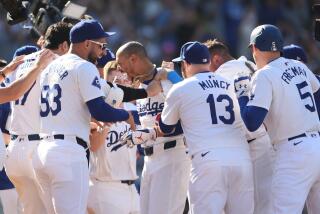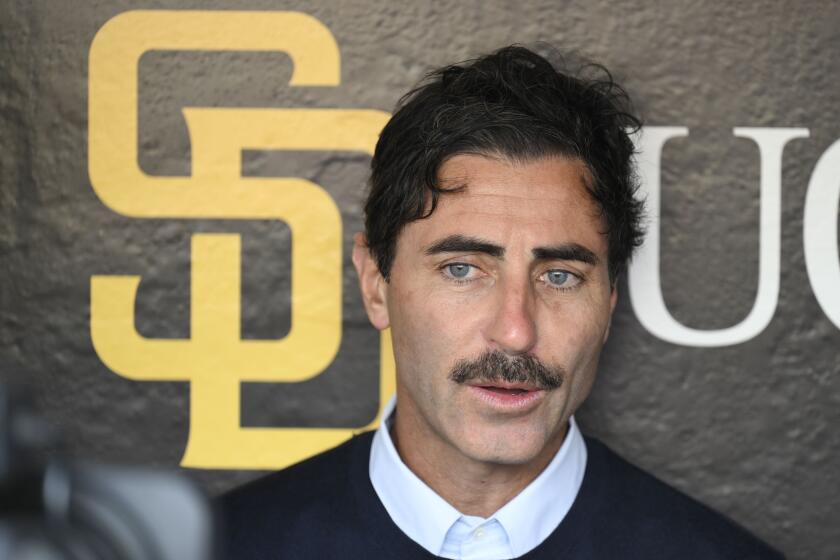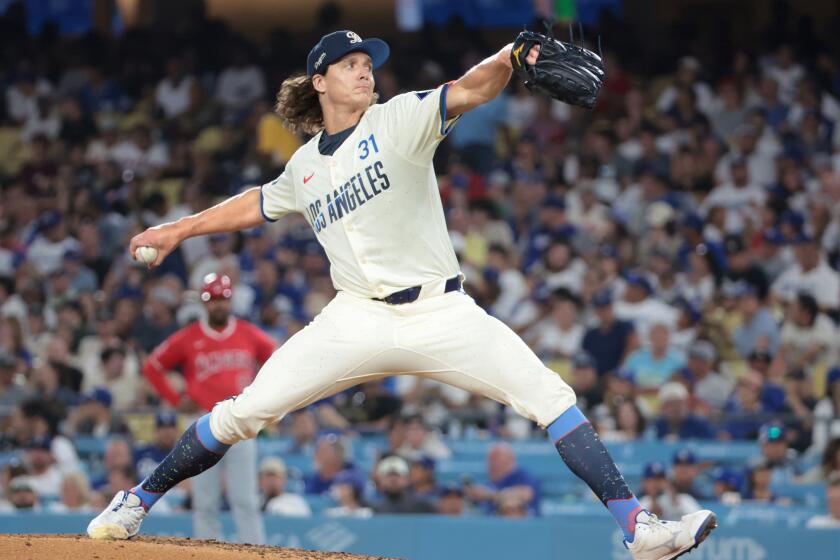Ramon Ortiz and his career are born again with Dodgers
Ramon Ortiz is always smiling.
“Always,” he said.
Whether he’s indoors or outdoors, sitting among his teammates or walking alone out of the Dodgers’ clubhouse, Ortiz wears the carefree grin of a frat-house drunkard.
Raising his arms to the clear Arizona sky above his head, he explained why.
“I’m with God,” he said.
The former Angel is born again in more ways than one, as his once-dead career has reemerged this spring from baseball’s graveyard — or, more literally, Fresno — probably earning the 36-year-old a place on the Dodgers’ opening-day roster.
Ortiz last pitched in the majors three years ago and is on a minor league contract but appears to be the leading candidate to be the Dodgers’ fifth starter. His 1.29 earned-run average and 19 strikeouts in 14 spring innings have put him at the head of a pack that includes Russ Ortiz, Carlos Monasterios, Josh Towers, Charlie Haeger and Eric Stults.
“The last time I felt like this was when I was in Anaheim,” he said.
In some ways, he said, he feels better.
Ortiz has a curveball he didn’t have back then.
“For that,” he said, “I have to thank God and the Japanese.”
God? The Japanese?
Understanding how these ideologically conflicting entities intersected to revive Ortiz’s spirit and baseball career requires a look back at how those parts of his life died. In the narrative Ortiz has created in his own mind, that point is marked by another death — that of his father in September 2003.
Ortiz doesn’t remember much about when his father passed away, only that it happened the year after the Angels’ 2002 World Series triumph and that he received the news when he was in Minnesota.
“I don’t remember the day or the year that happened because I don’t want to think about it,” he said. “It makes me too sad.”
Ortiz, who won 44 games for the Angels from 2002 through 2003, said his father’s death hit him hard. He was pushed out of the rotation in 2004 and traded to the Cincinnati Reds after the season.
Mediocrity followed.
From Cincinnati (9-11, 5.36 ERA in 2005), he went to Washington (11-16, 5.57 in 2006), then to Minnesota (4-4, 5.14 in 2007) and Colorado (1-0, 7.62 in 2007).
But during that time, he said, he found himself spiritually, deciding to commit his life to Christ.
“It’s something beautiful,” he said. “You feel more secure.”
Finding himself on the field would require him to go to Japan.
Unable to land a major league job for the 2008 season, Ortiz signed with the Kobe-based Orix Buffaloes. He lived with three teammates and rode the train to the ballpark almost every day.
“The city was really clean,” Ortiz said. “I liked looking at the people riding their bicycles to the train station every morning.”
The baseball was also different.
“The hitters are really skilled,” he said. “They have tremendous discipline. Major leaguers have more power and are greater threats to hit home runs, but the Japanese are better at making contact.”
Ortiz had to adapt.
He learned to pitch to contact. He also learned how to throw a curveball.
“You can always learn,” Ortiz said.
He returned to the U.S. in 2009, spending the entire season with the Grizzlies, the Giants’ triple-A affiliate in Fresno. But he didn’t consider the year to be a lost one, saying he had a chance to perfect his new pitch.
He played in the winter league of his native Dominican Republic and reported to the Dodgers’ camp a new pitcher.
Garret Anderson, his former teammate on the Angels who is also in the Dodgers’ camp on a minor league deal, said he has noticed the additions to Ortiz’s repertoire.
“He was basically a two-pitch pitcher back in the days,” said Anderson, referring to Ortiz’s fastball and slider.
Anderson said he’s also seen a change in Ortiz’s approach.
“He’s more mature,” Anderson said. “He’s figured out: ‘This is what I’ve got and I’m going to make the best of it.’ When he was younger, he was more all over the place, trying to do too much, being afraid of contact. I don’t see that anymore.”
But Anderson recognizes remnants of the old Ortiz.
“Personality-wise, he’s the exact same,” he said. “He’s always smiling. He hasn’t changed a bit. That’s refreshing, all the ups and downs he’s had, he’s still the same person.”
Manager Joe Torre used Ortiz for an inning out of the bullpen on Thursday, saying he is also being considered for a middle relief role.
Still, Ortiz’s place on the Dodgers isn’t assured.
What gives Ortiz an edge — over, say, Russ Ortiz — is that he has a clause in his contract that will allow him to become a free agent if he isn’t on the Dodgers’ opening-day roster. That contract also calls for a salary of $1 million if he is in the majors, with a chance to earn another $1.15 million in incentives.
Ortiz said he doesn’t know if he will exercise his out clause if he is assigned to the minors. But he said he likes the idea of playing in Southern California again.
“That would be miraculous,” he said.
twitter.com/dylanohernandez
More to Read
Are you a true-blue fan?
Get our Dodgers Dugout newsletter for insights, news and much more.
You may occasionally receive promotional content from the Los Angeles Times.










